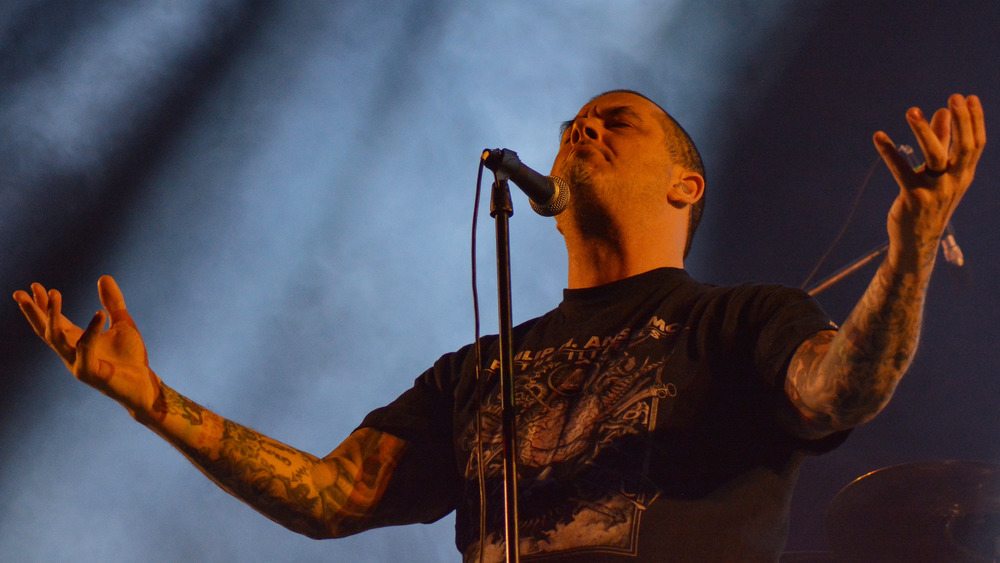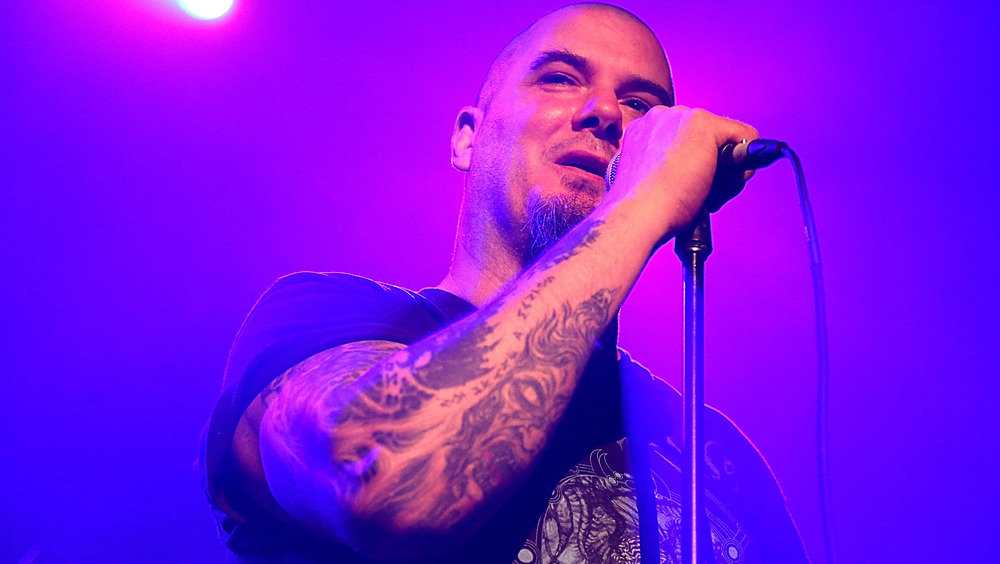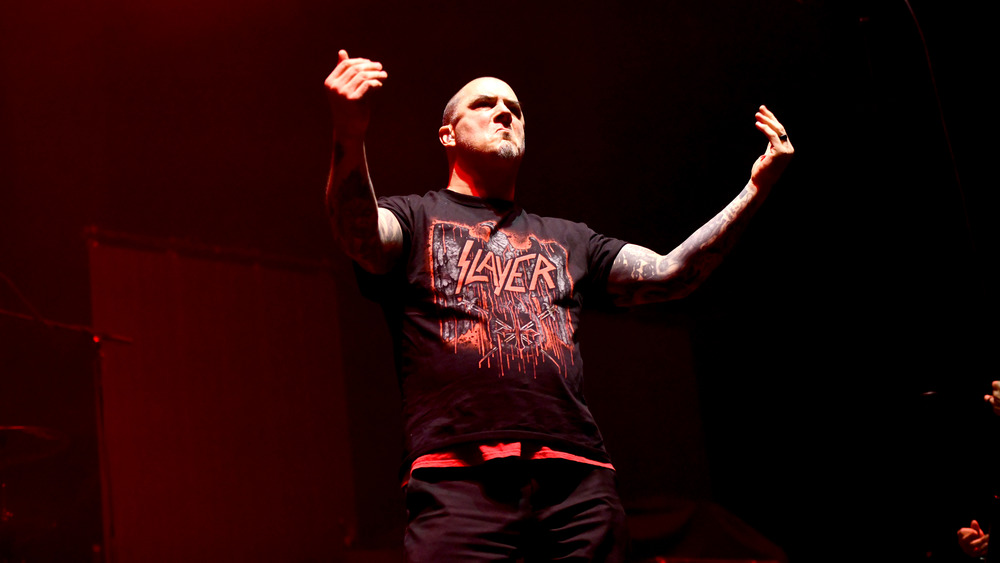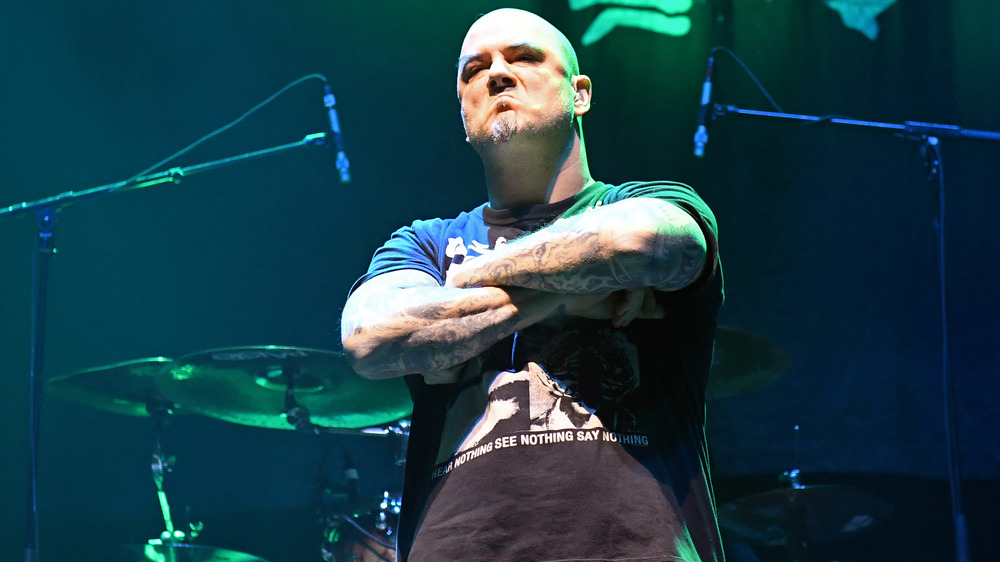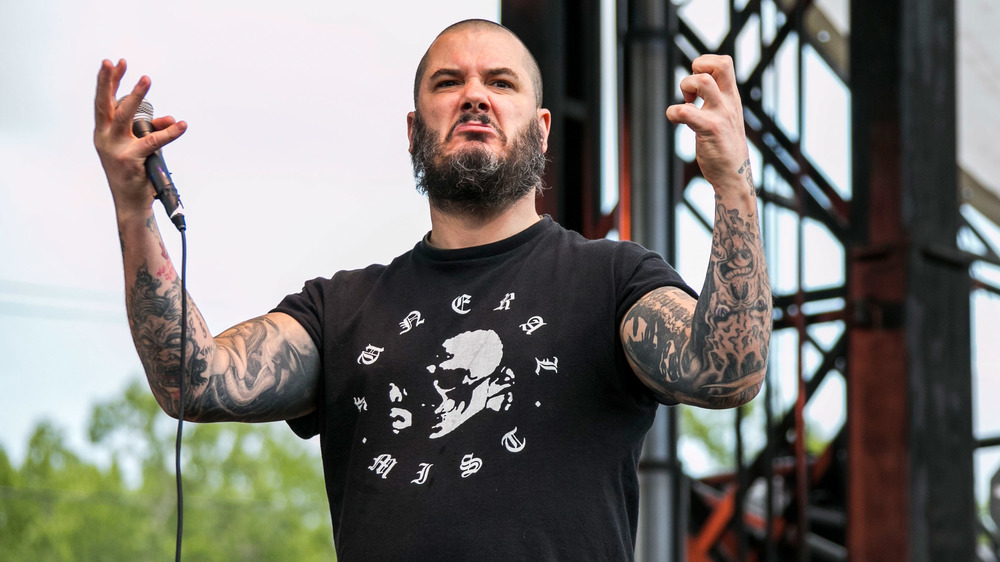The Untold Truth Of Pantera's Phil Anselmo
We're sure Phil Anselmo would like us to say he's the most famous former member of the heavy metal band Pantera, but in truth, he stands on par with the Abbott brothers. That being said, "The Kid" was a serious force during Pantera's heyday.
Anselmo joined the band in 1987, following David Peacock, and served as the frontman until Pantera broke up in 2003. In Anselmo's time, Pantera became known as the pioneer of "groove metal," thrashing crowds with a heavy dose of aggressive rock and smart lyrics. The band secured its place as a metal legend, one that transcends generations and a big part of the genre's history. And a big part of Pantera is Phil Anselmo.
Though he wasn't always around when the band first built their Texas fanbase, Anselmo was the frontman who accompanied them to fame. For "The Kid," as Anselmo calls himself, there's been more to his life than his voice and his fame.
Anselmo was molested as a child
We'll start our exploration of the untold aspects of Phil Anselmo off with a particularly difficult fact: Anselmo was molested as a child.
Anselmo's childhood isn't a popular topic of conversation, in part because the times he talks about it are few and far between. One element seems to be consistent throughout his past: It was dark. The Pantera frontman was raised by his mother and aunt during the Vietnam War. His father was around, but Dad didn't live with them. The boyfriend of Anselmo's aunt was part of the household though, and that boyfriend had served in the war. Vietnam followed the man home, and Anselmo remembers waking up at night because this man was screaming in his sleep.
The darkest part of Anselmo's childhood is probably the molestation, though he doesn't go into detail about it. "Guess who was molested his entire child-f******-hood by numerous people, both men and women," Anselmo says during a 2016 Rolling Stone interview. "Me." Oddly enough, this confession comes during the middle of a section where the singer is talking about "kids today" blaming parts of society for trends in harmful actions instead of individuals, an argument he uses the anecdote to support.
He's been accused of racism
To preface this story, you need to know a bit about the tragedy that surrounds Pantera. Dimebag Darrell Abbott, Pantera's guitarist and brother to Vinnie Paul, was murdered on stage in 2005. The band wasn't together at the time, but it certainly affected the entire world of rock. In 2016, a bunch of the greatest rockstars came together to throw a tribute concert to the late guitar phenom. Everyone who's anyone was there, including Foo Fighters, members of Slayer and Metallica, and, of course, Phil Anselmo.
Anselmo, who was onstage addressing the crowd and claims to have been quite drunk at the time, decided it was a good idea to give a Nazi salute and yell out, "White power!" Neither the news media nor the heavy metal community were happy with this. Anselmo apologized later for the incident and ended up doing an interview with Rolling Stone afterwards to explain exactly why he isn't a racist guy. Unfortunately for Anselmo, his argument against that characterization boils down to a more intricate version of the fallacious "I can't be racist because I have Black friends." Of course, you can say you're not racist all you want, but when you do racist stuff on the regular, no one is going to believe you. You know, like giving a speech on "white pride" and releasing a song that strikes at Jews and Muslims which, according to Billboard, Anselmo has done.
Banned from Dimebag's memorial
Anselmo likes to be shocking. It's his thing. He seems to say whatever is on his mind, whether or not it upsets fans, bandmates, or the community. Behaving in this manner is not the best way to keep to your friends around, which Anselmo should know by now, since it got him banned from former bandmate Dimebag Darrell's memorial.
When Pantera broke up in 2003, the Abbott brothers claimed Phil Anselmo left the band without telling them. The claim became one of the topics of Anselmo's interview in Metal Hammer's Xmas 2004 issue (found via Blabbermouth). Anselmo claims the band broke up because the Abbotts wouldn't communicate with him. Who knows which claim is correct? Either way, Anselmo says the original rift was between him and Dimebag. "He would attack me, vocally," Anselmo claimed.
The Pantera frontman would continue the interview by boasting about how he could "kill him like a f*****' piece of vapor" because of the size difference between the two, ending the rant with, "He deserves to be beaten severely." It was this type of sentiment — the way Anselmo had blasted Dimebag in the media before his death — that stuck with the Abbott family. It was this sentiment that led them to bar Anselmo from Dimebag's memorial, according to MTV, and it all boils down to what our mothers used to tell us: "Think before you speak."
Anselmo had a serious drug addiction
If you can't tell already, former Pantera frontman Phil Anselmo has a few problems. Some of his problems are of the type you'd expect from a rockstar. For instance, drug addiction.
It all started with a medical condition, or at least that's what Anselmo told the world during a 2018 podcast (found via The Fix). Somewhere along the line, probably due to all the intense rocking, the frontman blew a disc in his back, leading to the type of intense pain that only opiates can satiate. Anselmo was eating hydrocodone and Xanax to feel at ease. Eventually, the self-medication turned to heroin.
For Anselmo, the turning point came literally in the form of death. In 1996, according to Metal Addicts, the Pantera frontman was pronounced dead in the band's tour bus after a show in Dallas. Luckily, this "death" only lasted a few minutes before Anselmo was revived. Afterwards, the metal singer went through a rough battle with methadone, which he described to Metal Hammer (posted at Louder Sound) as "falling from a 50-story building every five minutes," in an attempt to get clean. It worked and the dude got sober, but it took a literal death to do it. The moral of the story can be summed up with a simple quote from South Park's Mr. Mackey: "Don't do drugs, mkay."
